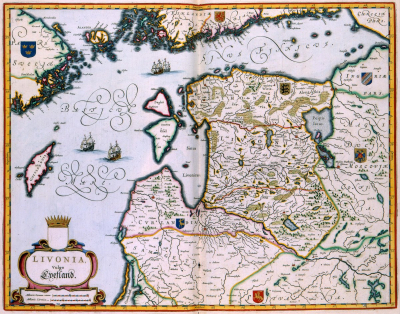The Battle of Durbe (Latvian: Durbes kauja, Lithuanian: Durbs mis, German: Schlacht an der Durbe) was a medieval battle fought near Durbe, 23 km (14 mi) east of Liepja, in present-day Latvia during the Livonian Crusade. On 13 July 1260, the Samogitians soundly defeated the joint forces of the Teutonic Knights from Prussia and Livonian Order from Livonia. Some 150 knights were killed, including Livonian Master Burchard von Hornhausen and Prussian Land Marshal Henrik Botel. It was by far the largest defeat of the knights in the 13th century: in the second-largest, the Battle of Aizkraukle, 71 knights were killed. The battle inspired the Great Prussian Uprising (ended in 1274) and the rebellions of the Semigallians (surrendered in 1290), the Couronians (surrendered in 1267), and the Oeselians (surrendered in 1261). The battle undid two decades of Livonian conquests and it took some thirty years for the Livonian Order to restore its control.
The Livonian Order was an autonomous branch of the Teutonic Order,
formed in 1237. From 1435 to 1561 it was a member of the Livonian Confederation.

1260Jul, 13
The Livonian Order suffers its greatest defeat in the 13th century in the Battle of Durbe against the Grand Duchy of Lithuania
Choose Another Date
Events on 1260
- 13Jul
Battle of Durbe
The Livonian Order suffers its greatest defeat in the 13th century in the Battle of Durbe against the Grand Duchy of Lithuania - 3Sep
Battle of Ain Jalut
The Mamluks defeat the Mongols at the Battle of Ain Jalut in Palestine, marking their first decisive defeat and the point of maximum expansion of the Mongol Empire. - 4Sep
Battle of Montaperti
The Sienese Ghibellines, supported by the forces of Manfred, King of Sicily, defeat the Florentine Guelphs at Montaperti.

 English
English  español
español  français
français  português
português  русский
русский  العربية
العربية  简体中文
简体中文 